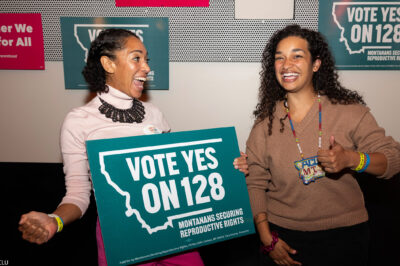As a Result of ACLU Litigation, Trump Administration Ends Policy Prohibiting Immigrant Minors from Accessing Abortion
Three Years After the ACLU First Challenged the Policy in Court, the Office of Refugee Resettlement Changes its Policy to Ensure Young People in its Custody Will Not be Blocked From Accessing Abortion
WASHINGTON — The Trump administration’s Office of Refugee Resettlement (ORR) issued a new policy today clarifying that ORR and ORR-funded shelters cannot block or interfere with unaccompanied immigrant minors’ access to confidential reproductive health care, including abortion. The change comes after three years of litigation from the American Civil Liberties Union.
Among other changes, the new policy instructs ORR and shelter staff that: Federal staff and ORR-funded shelter staff are prohibited from obstructing or interfering with immigrants’ access to non-directive counseling, abortion counseling, state judicial bypass proceedings, and abortion itself; and from communicating information about a minor’s pregnancy or their decision to have an abortion without their consent (with very narrow exceptions). The official policy change issued by federal government largely tracks with the terms of the injunction the ACLU won in court. As a result, the parties are dismissing the case.
“After three years of battling in court alongside brave young women, we are relieved that the government finally abandoned its attempts to block young people in its custody from accessing abortion,” said Brigitte Amiri, deputy director of the ACLU Reproductive Freedom Project. “Today’s policy change rights one of the wrongs this administration has committed against immigrants in detention, but their health and safety are still very much at stake. To protect reproductive freedom for all, we still have a fight ahead of us — including ensuring that Roe v. Wade remains the law of the land.”
The ACLU first sued on behalf of Jane Doe, a then 17-year-old Central American immigrant in 2017. The suit came after the organization Jane’s Due Process and other groups working with young immigrants discovered that ORR, which has custody over immigrants under age 18 who come to the country without parents, had instituted a policy of blocking pregnant young people in its care from accessing abortion care and trying to coerce them to carry pregnancies to term against their will.
When Jane found out she was pregnant after being placed in a government-funded shelter, she immediately asked for an abortion. Federal officials responded by ordering the shelter to block her access to abortion care and forced her to receive counseling at a religiously affiliated “crisis pregnancy center.” Officials also notified Jane’s family members of her pregnancy, without her consent and even though she had already obtained a court order permitting her to make her own medical decisions without involving her parents. Jane took the administration to court, fighting back to protect her own right to reproductive freedom and the rights of a class of hundreds of other young people who were also subject to ORR’s anti-abortion policy. After a protracted legal battle, Jane won a court order blocking ORR from obstructing all pregnant immigrant minors in its custody from making their own decisions about their pregnancies.
In response to this news, Jane Doe issued the following response:
“After three years of waiting, I am so glad to know that what happened to me will never happen to anyone else. The decision to have an abortion is personal and belongs to each individual — no one should be shamed for making the right decision for themselves or blocked from doing so. I came to this country to make a better life for myself, and I am working on a building a life that I can be proud of. I am happy to know that my fight means that other young women like me will be able to make the decision about whether to become a parent for themselves.”
Attorneys on the case include Amiri, Meagan Burrows, Jennifer Dalven, Lindsey Kaley, and Daniel Mach of the ACLU; Arthur Spitzer and Scott Michelman of the ACLU of the District of Columbia; Melissa Goodman of the ACLU of Southern California; and Elizabeth Gill of the ACLU of Northern California.





